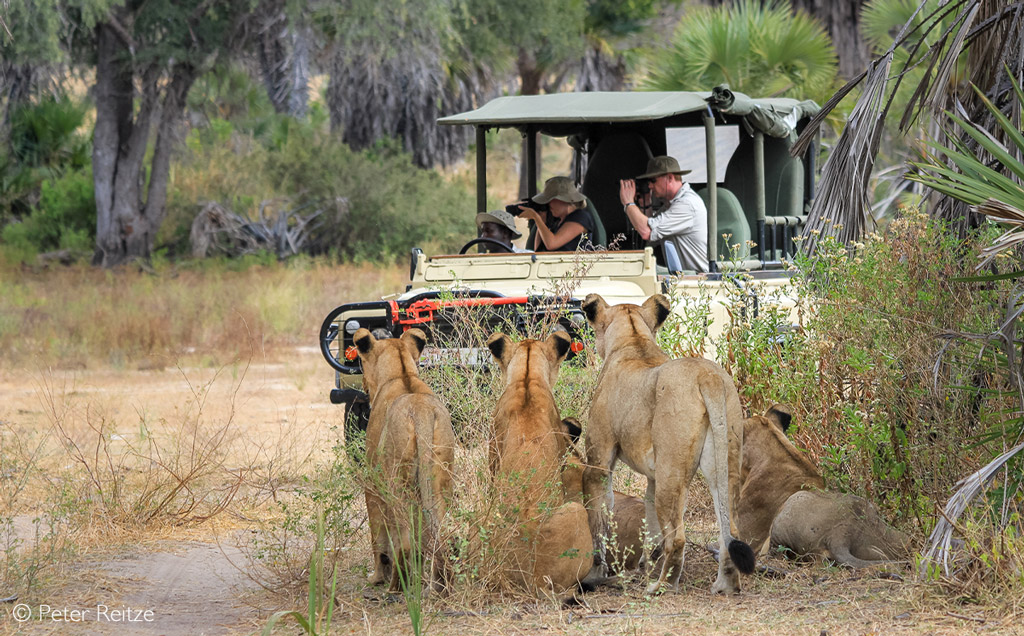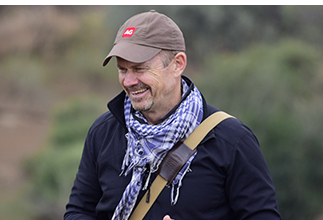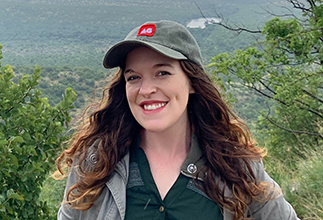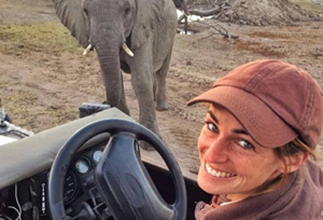
This is a copy of our weekly email newsletter. Subscribe here to receive the newsletter.
Rhino dehorning impacts + Ethiopian wolves + Great Migration

Just say no. A rant.
When your travel agent offers a visit to any establishment that offers touching a wild species as entertainment – say no. When your child wants to ‘save’ lions, tigers or cheetahs by volunteering at a big-cat breeding or cub-petting facility – say no. When you are asked to donate to any charity or facility that offers petting or walking with wild species – habituated or not – say no. Elephant-back riding or chimp cuddling – no. Do the research beyond the glossy brochures and claims of conservation benefits such as research and re-introduction to the wild, ask pointed questions and say no if there is any element of touching as a benefit for visitors or volunteers. It’s that simple. Most of these abusive facilities are in South Africa – check out this valuable resource to inform your decisions. If you are not yet convinced of the insidious evil of the captive big cat industry in this country, scroll down to watch this week’s featured video.
So, a few days ago, a little sparrowhawk joined me in my home office. She hurtled in after mistiming an attack on red-billed firefinches and blue waxbills at the garden bird bath. No harm done; she was duly caught and released – after giving me her most threatening glare. Life is good 🙂
Keep the passion

Simon Espley – CEO, Africa Geographic
From our Editor – Taryn van Jaarsveld

We have a rhino-poaching crisis on our hands, and dehorning has emerged as one of the vital strategies in curbing incidents of poaching. But for years, many have wondered what impact dehorning has on the individual rhinos that have faced the chainsaw. A new study suggests concerning implications for black rhinos. Read our first story below.
In the Serengeti and Maasai Mara ecosystems, an incredible spectacle unfolds as large herds of wildebeest and zebra embark on their tireless quest for sustenance and water. Our second post below celebrates the wonders of the Great Migration, outlining the best safaris on offer for witnessing the Greatest Show on Earth.
High up in the Ethiopian Highlands, amidst the spectacular massif of sharp crags and cliffs, lives one of Africa’s most unique animals: the Ethiopian wolf. This stealthy canid is the most endangered carnivore in Africa. Fortunately, there are still places where these wolves are thriving. Read all there is to know about Ethiopian wolves in our third story below.
Happy celebrating Africa!

Story 1
https://africageographic.com/stories/missing-the-point-new-study-suggests-that-dehorning-can-negatively-impact-black-rhino-social-behaviours/
DEHORNED RHINOS
A new study suggests dehorning can negatively impact black rhino social behaviours
Story 2
https://africageographic.com/travel/experiences/great-migration-safari
GREAT MIGRATION
Our guide to safaris celebrating the Greatest Show on Earth
Story 3
https://africageographic.com/stories/ethiopian-wolf/
ETHIOPIAN WOLF
The Ethiopian wolf is the most endangered carnivore in Africa, found only in the Ethiopian Highlands
 TRAVEL DESK UPDATES:
TRAVEL DESK UPDATES:
Experience the ultimate African adventure in Botswana or uncover a hidden paradise in Lake Malawi. Our travel experts are waiting to help you:
Botswana salt pans – 4days/3nights – from US$945 pps
Embark on a safari against the backdrop of one of Africa’s most hauntingly beautiful landscapes. From the stark figures of ancient baobabs and the imposing forms of elephants, to habituated meerkats and zebra migrations, this tour of the world-famous salt pans in Botswana – Makgadikgadi Pan and Nxai Pan – goes far beyond the average “Big 5” safari to create a once-in-a-lifetime experience.
Stay at Kaya Mawa, Likoma Island, Lake Malawi
Beach-front lodge Kaya Mawa is hidden away on Likoma Island in Lake Malawi – one of Africa’s best-kept secrets. This fresh-water lake is surrounded by gorgeous beaches and interesting fauna and flora, including the greatest diversity of fish anywhere on the planet. All internal flights and transfers (from the nearest international airport) are included when you book a minimum of 4 nights for travel in 2024.

From our Scientific Editor – Jamie Paterson

Lately, my nights have been filled with a series of vivid and bizarre dreams, none of which I can remember in any great detail when I wake. If I had more faith in the mystic and the occult, I might be rushing to a dream guide or offering up prayers to Morpheus in search of understanding, but as it is, I suspect they are just a product of exam-brain. (Fourth year of veterinary science has proved challenging!)
The mysteries of slumber occupy researchers studying many different species. Last year I told you about dreaming spiders, but did you know that there is a strong possibility that octopuses dream too? Neuroscientists have found remarkable similarities in the brain patterns of sleeping octopuses and humans, including a REM-like state. Like the spiders (and dogs, cats, and people), the octopuses twitch and move their eyes around. However, the best part is that they also rapidly change colour – putting on a fascinating display of patterns that flicker over their skin. It is really quite beautiful.

 WATCH: Blood Lions, the award-winning documentary exposing the terrible truth behind the cub-petting, predator-breeding, canned lion-hunting and lion-bone industries in South Africa, is now available free to view on Youtube. Check it out (1:24:40). Click here to watch
WATCH: Blood Lions, the award-winning documentary exposing the terrible truth behind the cub-petting, predator-breeding, canned lion-hunting and lion-bone industries in South Africa, is now available free to view on Youtube. Check it out (1:24:40). Click here to watch
To comment on this story: Login (or sign up) to our app here - it's a troll-free safe place 🙂.![]()






